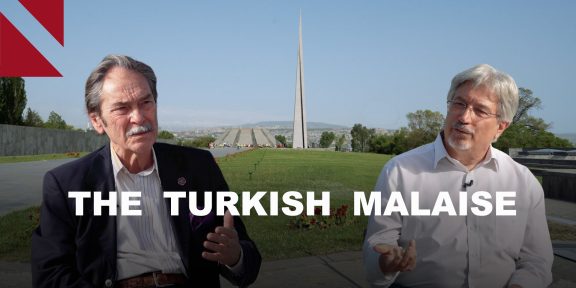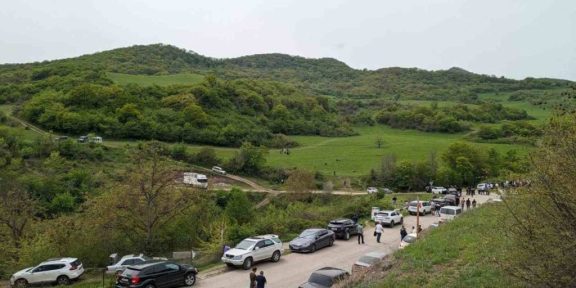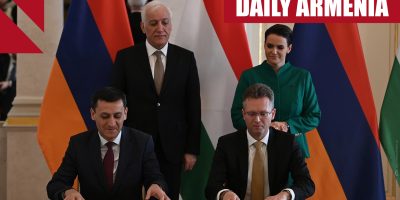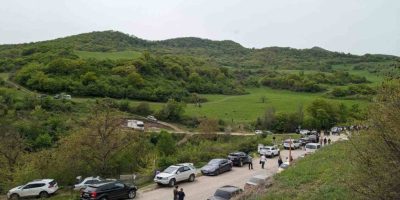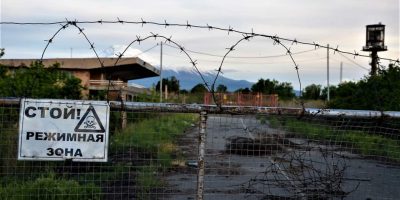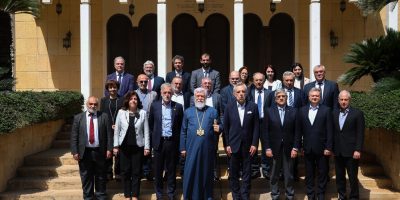 Birthright volunteer Casey Edgarian in Shushi, Nagorno Karabakh.
Birthright volunteer Casey Edgarian in Shushi, Nagorno Karabakh.
Casey Edgarian is currently a Birthright volunteer at CivilNet. During his stay in Armenia, he spent three weeks in the Republic of Nagorno Karabakh teaching English at the Naregatsi Art Institute in Shushi. This is a story of his experience and impressions.
As I hopped off the 8-hour marshrutka from Yerevan and stepped onto the frozen, -10º ground, I realized I had finally arrived. The sounds of blaring horns and arguing old ladies had receded to a nearly deafening silence. This is it. This is Artsakh.
I began my first day at work the day after. No time wasted. As I trudged through the snow and mud, I felt my jaw slowly drop as I stared at the mountains that surrounded me. All I could think of was how this was something out of Lord of the Rings. This is truly otherworldly. No wonder it is so vied after by the Aliyev dynasty.
I arrive at work and am greeted by my boss, Julietta, and my fellow teacher, Lusin. We get acquainted, sipping on tea and coffee and warming our frozen feet up by the radiator. Later, Lusin invites me to lunch. Since there aren’t any restaurants in Shushi, we eat at her apartment. Where in the Western world would someone ever invite you to your house only hours after meeting them? I guess that’s one of the things that makes Armenia special. Afterwards, I start my first class and I’m blown away by how many people show up: a group of about 15 people steadily stream in, between the ages of 16 and 52. This was the first time I had ever taught a class… I sure have my work cut out for me!
Since the war, Shushi’s population has dwindled down to a little more than 4,000. While it has a lot of the infrastructure of a big town, it really is just a village now. Because of this small-town feel, I get to connect with co-workers and students much faster than I would in a big city. Shushi is the sort of place where people bake their own bread and fetch eggs from the backyard. Nonetheless, I’m still amazed by how many cultural events go on in the collective Stepanakert-Shushi “metropolis”. It seems like I have attended a new play or concert every few days since I arrived. And let’s not forget the Artsakh tradition of throwing kefs. I’m sure in the past two weeks, I’ve eaten enough khorovats, sipped enough tti oghi and drank enough homemade wine to last me well until the summertime.
The openness of Artsakh blew me away coming from Yerevan. One day, I went to fetch my visa in Stepanakert. I was shocked by how people are not only willing to help, but also really enjoy doing so. This goes for everyone, regardless of age or gender. One towering man my age, who may have been one of the few people in Armenia that has managed to make me feel short, greeted me with a big smile after I asked for directions to the Foreign Ministry office and told me the way in minute detail. On the way back, I again lost my way. When I asked for help from a tatik, she walked me all the way to the bus station, while chatting away in the Karabakh dialect. I smiled, muttered a few “ha’s” and nodded my head despite not understanding anything she said other than asking if I’m married.
 Casey with some of his students at the Naregatsi Institute, Shushi.
Casey with some of his students at the Naregatsi Institute, Shushi.
Another aspect of this experience that completely threw me off guard is just how dedicated students are to learn English and how proficient they are to begin with. I think a lot of people in the diaspora, as well as in Yerevan, tend to think that Artsakh is somewhat like the last frontier. While it is true that a lot of people here have been beleaguered by the war, they really have a determined spirit to better themselves and enrich their land, and have found that pathway through education. Students, soldiers, academics, and professionals rush over to Naregatsi everyday from Monday to Friday to attend. When I was in college, it seemed like most of the time less than half my class would show up, even though they had nothing else important they had to attend to.
My experience in Artsakh has really made me realize how fortunate I am to live in the security and comfort of the Western world. The hardiness of some of the people I encountered was truly inspiring, and their openness was something that really took me by surprise. Though things in Armenia and Artsakh are not at their best currently, I am really excited for the future and hopeful that things will change for the better. I think Artsakh’s perseverance and determination to do better despite the odds pitted against it should not only be a model for Armenia, but for the world in general.
I strongly encourage other Birthright volunteers, diasporans, and Hayastantsis to not only visit Artsakh, but to take a few weeks and live there. The kindness and authenticity of the people is something that I have yet to experience in any other place I have traveled to. Artsakh will challenge you and surprise you in so many ways. I hope that with the help of the diaspora and the international community at large, Shushi will regain its former glory and the local Artsakhtsi people will be able to enjoy a higher quality of life as time goes on.
Casey Edgarian
marshrutka – public transportationkefs – partieskhorovats – grilled meattti oghi – mulberry vodkatatik – grandmother






